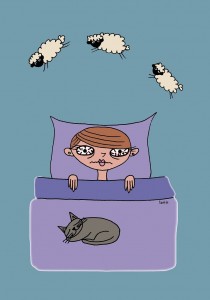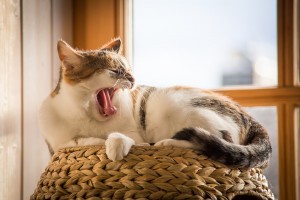Sleep, that darn elusive thing that only gets more challenging as we age; how do we get enough of it, especially when it evades us at 3AM? This is a question I’ve been pondering between two and five in the morning for the last few years. The frustration, exhaustion, and anger I’ve felt from time to time during my bouts of insomnia have almost sent me over the edge.
darn elusive thing that only gets more challenging as we age; how do we get enough of it, especially when it evades us at 3AM? This is a question I’ve been pondering between two and five in the morning for the last few years. The frustration, exhaustion, and anger I’ve felt from time to time during my bouts of insomnia have almost sent me over the edge.
And the tips I’ve read over and over don’t help because I do them all with no great change. Have a dark room – check, no screens in your bedroom – check, make sure the temperature isn’t too hot or cold – done that, use earplugs if sounds bother you – inserted and mostly deaf. By the looks of it, in my “cave” (as my husband calls it), you would think my pillow-over-my-head, eye mask, ear plugs, fan going, womb-like conditions would be perfect to sleep an entire night through, but no, that’s not often the case.
Recently, while waiting for my daughter to peruse every book in a used bookstore, I came across Say Goodnight to Insomnia by Gregg Jacobs, Ph.D. He claimed that his six-week program is “proven more effective than sleeping pills.” I’ve read books on sleep and insomnia before and didn’t find them that useful, but decided to give this one a try anyway. Surprisingly, I found some interesting and helpful tips and information. Here are a few you may not know:
Body Temperature and Sleep – our body temperature rises and falls throughout the day. It is lowest in the morning, then increases as the day progresses, with the highest reached at 6pm for most people. A few hours later, it drops until we fall asleep. This circadian rhythm of body temperature is linked to our activity levels during the day as well. We can help our bodies maintain this rhythm by exercising or engaging in activities that raise our body temperatures so they will decrease later in the evening. Typically, when exercise is suggested to help with sleep, many of us assume that it’s to release pent-up energy, which it probably is on some level, but it is more to do with one’s body temperature, and the necessary rise and fall of it in order to promote sleep (along with light and dark exposure).
According to Jacobs, people who get little to no real physical activity on a regular basis can have more trouble sleeping because their body temperature does not fluctuate very much. And even that nightly bath or shower can help because, not only is it often relaxing, the hot water will warm the body. Then, as the body quickly cools down, it drops to sleeping temperature faster (that’s no excuse to avoid exercise though).
Core Sleep – five and a half hours is the magic number of Z’s in order to have daytime performance not “suffer significantly.” Jacobs says that we might not feel the greatest with that amount of sleep, but we can still function. He also adds that we  often need less than we think: “Sleep is similar to food in that our body also needs a core amount of food to function. Most individuals, however, eat more than their core requirements to feel good.” I can honestly say that I do not feel good with only five and a half hours of sleep, but at least I know now that I can get through the day (although with probable “mood impairment,” he notes).
often need less than we think: “Sleep is similar to food in that our body also needs a core amount of food to function. Most individuals, however, eat more than their core requirements to feel good.” I can honestly say that I do not feel good with only five and a half hours of sleep, but at least I know now that I can get through the day (although with probable “mood impairment,” he notes).
He also says that most insomniacs are getting more sleep than they think. If you feel like you’re tossing and turning all night, you might be awake for periods of time, but during others, you’re actually sleeping. And if you don’t get the core sleep you need one night, Jacobs claims that your brain will do everything possible to get it the next. He says, “the brain compensates by producing an increased percentage of deep sleep and dream sleep, which also explains why we don’t have to recover all the sleep we lose.”
Mind over Matter – in essence, Jacobs thinks that insomnia for short periods of time, during stress, grief, or major life changes (like having a baby) is normal. However, when those periods stretch out into a chronic problem, it’s our thoughts and behaviors driving it. I know that once I started waking up at 4am and not getting back to sleep after, I then feared it happening again, which led to me worrying about it at 4am, and inevitably, I couldn’t get back to sleep because I was obsessing about it. He says the solution is to recognize these thoughts (Negative Sleep Thoughts) and change them.
Like anything, that’s easier said than done. It’s hard to break out of ingrained thoughts when you can do nothing but hope and pray that sleep will come. The lack of control of it is what kills me and is exactly what Jacobs says we need to let go of. But when I’m tired and excessively cranky day after day, it’s exceptionally hard to change that. I often need a reset by going to bed early in the evening (which he advises against because it will interrupt our body’s rhythm).
I certain ly have not solved my insomnia problem entirely, but his book taught me a few things I did not know about sleep and how I can help myself when I can’t get it. It is certainly a work in progress for me, but I do feel better off than I did a few months ago. If only I could sleep like my son who literally closes his eyes and stays asleep all night, almost nothing wakes him, and he comes downstairs in the mornings refreshed and energized.
ly have not solved my insomnia problem entirely, but his book taught me a few things I did not know about sleep and how I can help myself when I can’t get it. It is certainly a work in progress for me, but I do feel better off than I did a few months ago. If only I could sleep like my son who literally closes his eyes and stays asleep all night, almost nothing wakes him, and he comes downstairs in the mornings refreshed and energized.
Ah, “to sleep, perchance to dream…”